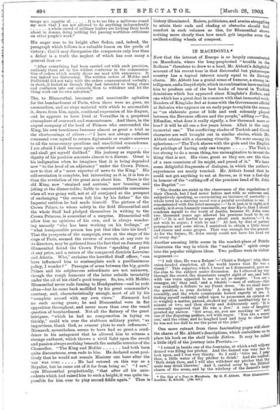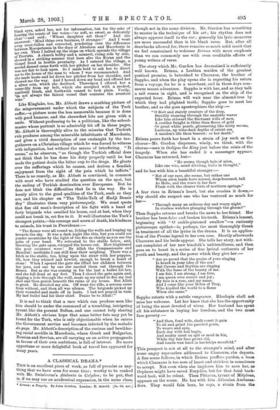IN MACEDONIA.* Now that the interest of Europe is so
largely concentrated on Macedonia, where the long-prophesied " trouble in the
Balkans " threatens to draw to a. head, Mr. Abbott's delightful account of his recent tour in that distressful but picturesque country has a topical interest nearly equal to its literary charm. Mr. Abbott has a genial sense of humour, a strong in- telligence, and a limpid style, which in combination have enabled
him to produce one of the best books of travel in Turkish dominions which has appeared since Kinglake's Eothen, and one which has a great deal in common with that immortal work. Readers of Kinglake feel at home with the Government official at Monica who appears on an early page to explain the census as " an elaborate game of hide and seek solemnly played between the Revenue officers and the people," adding:—" But, Effendim, what does it really signify, a few thousand more or less ? it will be all one a few years hence. Allah is the only immortal one." The conflicting shades of Turkish and Greek
character are well brought out in similar stories, which Mr. Abbott relates with a charming vivacity. We note among his aphorisms :—" The Turk shares with the gods and the EnglishTurk is
lish
the privilege of having only one tongue The too strong to do a mean thing, too unimaginative to invent the thing that is not. His vices, great as they are, are the vices
of a race conscious of its might, and proud of it." We have some delightful fragments of dialogue, in which the author's experiences are neatly touched. Mr. Abbott found that he could not get anything to eat at Serres, as it was a fast-day in honour of the " cutting-off of the precious head of St. John the Baptist " :-
" The Greeks are strict in the observance of the regulations of their Church, but I had never before met with so extreme and, subjectively speaking, so excruciating an instance of austerity: a whole town in a starving mood was a painful revelation to me. I remonstrated with the hotel manager Is it just, is it right, is it saintly, is it even humanly reasonable, my dear Kyrie, that I should condemn myself to the worst of deaths, because St. John some two thousand years ago allowed his precious head to be cut off I) It is not lawful to argue about such matters.'—' I do not wish to argue ; I wish to eat !' At last, by dint of patient persuasion and some silver, I contrived to obtain a little bread and cheese and some grapes. That was enough for the present. As for the future, St. John surely could not have his head cut off every day."
Another amusing little scene in the market-place of Petritz illustrates the way in which the " nationalist " spirit creeps into the popular religious ideas. Two pedlars were in violent argument :—
"'I tell thee, He was a Bulgar.'—' Christ a Bulger ! why, thou onion-headed simpleton, all the world knows that He was a Greek !' This repartee, which I heard as I dismounted, gave me the clue to the subject under discussion. As I elbowed ray way through the crowd, the disputants caught sight of me, and both with one voice appealed to me to act as umpire. You are a. stranger, sir,' they said, and a tchelebi '—man of culture—that was evidently a tribute to my Frank dress. So we shall leave the question to your decision.' A deep silence fell upon the assembly, and the whole countryside looked eagerly at me. I, finding myself suddenly called upon to pronounce an opinion on so weighty a matter, paused, stroked my chin meditatively for a minute or two, and then slowly and deliberately said: It is commonly supposed that He was a Jew.' A roar of laughter greeted my answer. Get away, sir, you are mocking us said one of the disputing pedlars, red with anger. You are a merry one,' said the other, and he laughed loud and long to show that he was not too dull to see the point of the joke! "
One more extract from these fascinating pages will show
the charm of Mr. Abbott's descriptions, which emboldens us to place his book on the shelf beside Eothen. It may be called
a little idyll of the journey into Provista :-
" I reined in beside one of the fountains, at which a tall willowy damsel was filling her pitcher. And the damsel was very fair to look upon, and I was very thirsty. So I said : 'Give me, I MY thee, a little water of thy pitcher to drink.' And she replied.. 'Both drink thou, and I will also withdraw my pitcher that thy mule may drink likewise.' And I, carried away by the Biblical charm of the scene, and by the witchery of the damsel's large • The Tale of a Tow ix Macedonia. By G. F. Abbott. With Illuetirafiops• London: E. Arnold. 114e. net.] black eyes, asked her, not for information, but for the sake of Nearing the music of her voice= so soft, so sweet, so delicately clear '—and said : ' Whose daughter art thou ?' And she answered: Mind thine own business, 0 stranger!' And I went away crest-fallen and corrected, pondering over the difference between Mesopotamia, in the days of Abraham and Macedonia in my own. Thus I halted up the slope on which spreads the village of Provista. A church belfry and a minaret, rising aide by side, showed in a striking manner that here also the Koran and the Gospel lived in hostile proximity. As I entered the village, a second damsel came forth with her pitcher on her shoulder. She was not fair to look upon. So I made bold to ask her to direct me to the house of the man to whom I was recommended. And she made haste and let down her pitcher from her shoulder, and showed me the way. And I bowed down my head and offered her a silver coin, which she declined. Thereupon I offered her a water-lily from my belt, which she accepted with a modest, maidenly blush, and forthwith ceased to look plain. Verily, 'tis not always the fairest vessel that contains the sweetest wine."
Like Kinglake, too, Mr. Abbott draws a scathing picture of the misgovernment under which the subjects of the Turk suffer,—a picture none the less memorable because it is done with good humour, and the shrewdest hits are given with a smile. Without professing to be a politician, like the school- master whose portrait is so admirably hit off in these pages, Mr. Abbott is thoroughly alive to the miseries that Turkish rule produces among the miserable inhabitants of Macedonia, and gives a vivid description of one onslaught by the tax- gatherers on a Christian village which be was forced to witness with indignation, but without the means of interfering. " It seems," as he observes, " as though the Turkish official does not think that he has done his duty properly until he has made the patient drain the bitter cup to the dregs. He gloats over the sufferings which he causes, and derives a fiendish enjoyment from the sight of the pain which he inflicts." There is no remedy, as Mr. Abbott is convinced, in common with most who have studied the question on the spot, but the ending of Turkish domination over Europeans. But he -does not blink the difficulties that lie in the way. He is keenly alive to the good qualities of the Turk, such as they .are, and his chapter on "The Table-Talk of Hadji Demir Bey" illustrates them very picturesquely. We must quote that fine old man's description of his fight with a band of forty brigands who assailed his house, and at last, when they could not break in, set fire to it. It well illustrates the Turk's strongest points,—his courage and scorn of death, his kindness to animals, his trust in Providence :- " The flames were all round us, licking the walls and leaping up towards the sky. It was a dark night like this, but you could see .yonder mountains by the light of the fire as clearly as you see the palm of your hand. We retreated to the stable below, and, throwing the gate open, whipped the horses out. How frightened the poor creatures were! By Allah the Compassionate and Merciful ! methinks I can still hear their neighing. There was a bitch in the stable, too, lying upon the straw with her puppies. Oh, how they whined and howled, enough to break a heart of stone ! When I opened the gate she lifted her children between her jaws, and one by one she carried them out through the flames. But as she was coming in for the last a bullet hit her, and she fell dead at my feet. Then I closed the gate again and, digging a hole through the wall, made up my mind to fire my last shot and then perish beneath the ruins of my house. But Allah is great. He directed my aim. Off went the rifle, a scream came from without, and then all was silence. The brigands picked up their wounded and made off in haste. I had not prayed in vain. My last bullet had hit their chief. Praise be to Allah !"
It is sad to think that a race which can produce men like this should be under the command of a trembling, intriguing tyrant like the present Sultan, and one cannot help sharing e; Mr. Abbott's obvious hope that some better fate may yet be found for the Turk, who is only objectionable when he enters the Government service and becomes infected by the maladie du pays. Mr. Abbott's description of the curious and bewilder- ing racial muddle in Macedonia, where Greek and Bulgarian, Russian and Servian, are all carrying on an active propaganda in favour of their own ambitions, is full of interest. No more opportune or more delightful book of travel has appeared for many years.











































 Previous page
Previous page